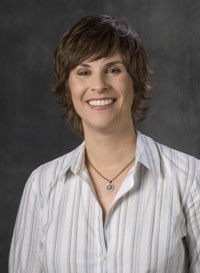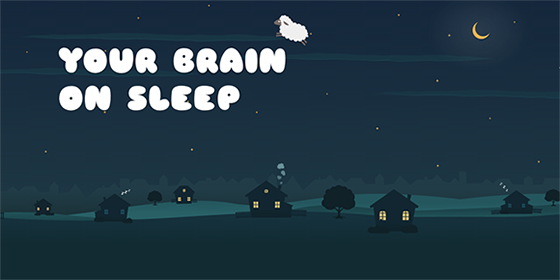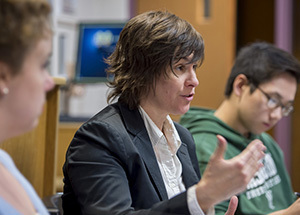 Jessica Payne
Jessica Payne
Jessica Payne never dreamed of becoming a rising star in the science of sleep.
In fact, until midway through graduate school, she didn’t think much about the subject beyond her own off-and-on problems getting some shut-eye.
Now, she can’t keep it off her mind.
“We don’t understand enough about how to improve sleep, because people treat sleep like it’s expendable. Yet the data says the opposite,” said Payne, the Nancy O’Neill Collegiate Chair in Psychology. “Sleep gets woefully ignored, but it’s something we should protect. I genuinely believe that everybody can sleep better.”
Payne’s tireless work recently earned her the Psychonomic Society ’s Early Career Award, given to individuals who have made significant contributions to scientific psychology early in their careers.
The director of Notre Dame’s Sleep, Stress, and Memory Lab, Payne’s research focuses on how sleep and stress influence learning, memory, and emotion.
“Her scholarship cuts across programmatic lines—it is biological, clinical, and cognitive neuroscience,” said Daniel Lapsley, professor and chair of the Department of Psychology. “It shows that sleep is an active mechanism that is central to the consolidation of emotional memories.
“This line of research is exciting and field-expanding and will come to dominate memory research for some time to come.”
Finding a Purpose
For Payne, her professional passion first took hold as a graduate student at the University of Arizona, when her best friend recommended that she take a course on sleep and cognition.
She loved it, and quickly dove deep into sleep research. Before earning her Ph.D., she had already developed a neurobiological theory of dreaming that explored the role of cortisol in the memory consolidation process.
 Click here for more multimedia content on Jessica Payne’s research into what happens when we sleep.
Click here for more multimedia content on Jessica Payne’s research into what happens when we sleep.
“Looking at a normal night of sleep, it was interesting to me that levels of the stress hormone cortisol peak during the REM sleep cycle in the second half of the night, when crazy, fragmented, highly bizarre dreams occur,” she said. “I thought there might be a parallel with why memories formed under high levels of stress can become fragmented or seem false.
“Every night, you have high levels of cortisol at a time when these brain regions are active, and it might explain the fragmented nature of our dreams and memories under stress.
“Maybe it’s somehow beneficial that those memories become fragmented and get woven together in new ways. Maybe that helps us come up with new ideas.”
Building a Reputation
Payne wrote a paper that got the attention of Robert Stickgold, professor of psychiatry at Harvard Medical School and director of the Center for Sleep and Cognition. He became a mentor to her, and her postdoctoral fellowship was split between Harvard’s Department of Psychology and the Harvard Medical School’s teaching hospital.
Since coming to Notre Dame, she’s focused on continuing her stress and sleep research while also studying what their interaction means to memory and cognition, and to mental disorders like depression.
“Jess is passionate—about life, about science, about doing the right thing,” said another mentor, Lynn Nadel, chair of the faculty and the Regents’ Professor of Psychology and Cognitive Science at the University of Arizona.
“She is also really smart—the kind of smart that allows her to think both broadly and deeply. It is this combination of passion and creative intellect that earned her the Early Career Award. “
Payne’s work is now going beyond academic circles. In addition to serving as a go-to expert for major media outlets, including CNN and the New York Times, Payne recently wrote a piece for the Huffington Post on the benefits of sleep, challenging the societal notion that a lack of sleep is a “badge of honor” and a product of higher productivity.
“We live in this culture that says the harder and longer you work, the better you work,” she said. “But we know that there’s diminishing returns in terms of performance—and not only that, it puts you at risk for a lot of different mental and physical health problems.”
Making a Difference
 Jessica Payne in the classroom.
Jessica Payne in the classroom.
Beyond her research, Payne is one of the best teachers at the university, Lapsley said.
“Her teaching record, at all levels and by any metric, is superb. Her research attracts extraordinary student interest, and she has quite simply galvanized the educational culture of the department,” he said. “Her mentorship of students at all levels is the very model of our aspiration to provide a context whereby teaching and research are not only compatible but a mutual necessity.”
As for the recent award, Payne says she is focused on the possibilities ahead.
“It’s a huge honor,” she said. “And its recognition, I hope, that I’m integrating a lot of different domains.”


